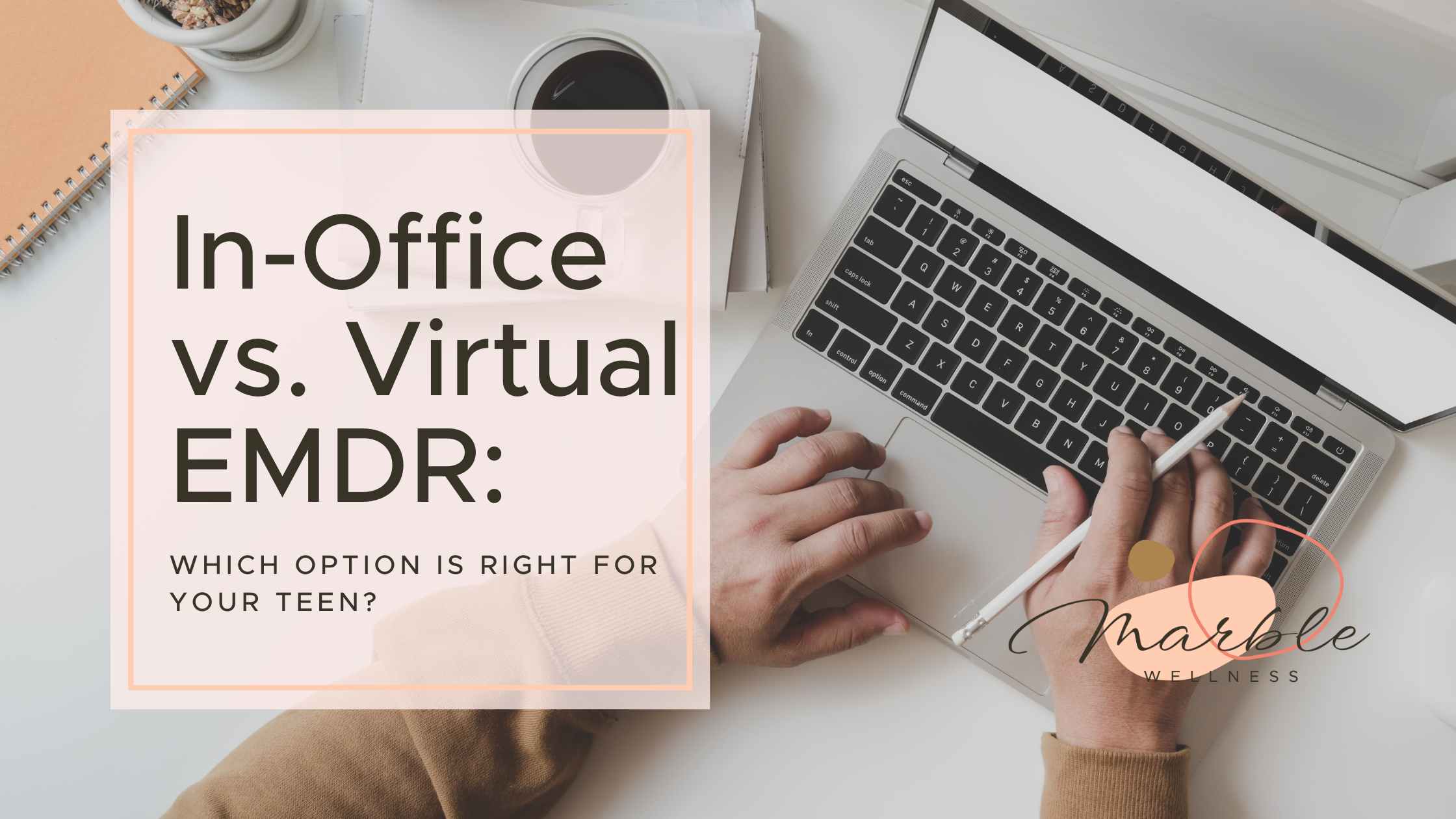
Therapy for Teens
Constant social comparison. Ever-shifting friendships.
The weight of expectations, from parents, teachers, and peers.
Navigating identity while fitting in — a delicate dance.
Overwhelming academic pressures. College on the horizon.
Managing the chaos of social media — likes, shares, and self-worth.
Big emotions, but feeling misunderstood.
Juggling extracurriculars with no room to breathe.
Trying to be everything, but not sure who you are.
Hormones, self-doubt, and a desire to be seen.
Pushing boundaries while longing for acceptance.
Teens have a LOT going on at the moment.
Life as a teen is HARD. As a parent, you may be witnessing your child navigate constant changes — physically, emotionally, and socially — while trying to keep up with everything around them. There’s pressure to fit in and stand out at the same time, to meet the expectations of parents, teachers, and peers, and to have a plan for the future when they’re still figuring out who they are. Social media adds another layer of stress, making it hard to escape constant comparison, judgment, and the fear of missing out. Every like, comment, or lack thereof can feel like a public scoreboard of your teen’s worth.
Then there’s the weight of schoolwork, extracurriculars, and responsibilities at home, all while navigating complex friendships, crushes, and shifting social dynamics. Teens often feel like they’re supposed to have it all together, but the truth is, they’re carrying a lot and often don’t have the tools to cope. They experience intense emotions, but they’re frequently dismissed as “just being a teenager.” It’s exhausting, isolating, and at times, overwhelming. And underneath it all, many teens feel like no one really gets what they’re going through.
Behaviors or Feelings Your Teen Might Be Experiencing That Could Be a Sign It’s Time to Start Therapy
Not all struggles are obvious.
Sometimes, it’s easy and obvious to see that a teen is struggling.
Yet there are plenty of teenagers who may seem to be “fine” or who you may even consider “successful”, “mature beyond their years”, or “have it all together.”
It’s important to look beyond those factors to consider if a teen needs some therapy support.
In those instances, here are some signs to look for:

- Feeling overwhelmed or anxious most of the time: Constant worry, racing thoughts, or an overwhelming sense of dread may signal that your teen is carrying more stress than they can handle on their own. Even for the teenager who is a high achiever and likes school and all of their extracurricular activities—it’s not normal, or healthy, to constantly feel anxious or overwhelmed.
- Mood swings or persistent sadness: If your teen experiences extreme highs and lows or if sadness, hopelessness, or numbness feels like it’s taking over, it may be time to talk it out with someone who can help.
- Trouble sleeping or changes in appetite: Difficulty falling asleep, staying asleep, or sleeping too much, along with eating more or less than usual, can be signs that your teen’s mental health needs some attention.
- Avoiding friends or social activities: If you notice that your teen is finding it hard to be around people they care about or you see them withdrawing from activities they used to enjoy, they may be struggling with depression, anxiety, or other challenges.
- Difficulty concentrating on schoolwork: If focus becomes a challenge and motivation for school or other responsibilities decreases, something deeper may be going on.
- Feeling like no one understands or being “different”: Your teen may verbalize feelings of being “different” or that they don’t belong, even if it’s not clear why. If you’re seeing a shift in their behavior or noticing them struggle to connect with others, this could be a sign they’re feeling out of sync with their peers or the world around them.
- Anger or irritability that feels out of control: If your teen has emotions that you think are more frequently bubbling up and also erupting more often than not, or if you notice them lashing out at others, you may want to consider therapy so they can learn to manage those feelings.
- Engaging in risky behaviors: Turning to alcohol, drugs, or other harmful behaviors to cope with difficult feelings is a sign that your teen may need support to find healthier ways to manage stress.
- Low self-esteem and constant self-criticism: Struggling with feelings of inadequacy, negative self-talk, or always comparing themselves to others can erode your teen’s mental health. Be on the lookout for phrases that may indicate they are having these thoughts.
How Do Therapists Make You Feel Better?
For many teens, their wish is simple: to feel better. Therapy for teens aims to foster the following experiences:
- Confidence: Feeling good about themselves and their abilities, with a sense of self-worth and self-respect.
- Belonging: Feeling connected to a group of friends, peers, or family and knowing they are valued and accepted for who they are.
- Calmness: Having inner peace and the ability to manage stress and anxiety without feeling overwhelmed.
- Hopefulness: Looking forward to the future with optimism and seeing possibilities ahead instead of roadblocks.
- Happiness: Experiencing joy, laughter, and moments of contentment that aren’t clouded by persistent worry or sadness.
- Control: Feeling in control of their emotions and decisions, rather than feeling controlled by their reactions or circumstances.
- Pride: Taking pride in their accomplishments, whether they’re academic, personal, or within friendships and relationships.
- Resilience: Being able to bounce back from setbacks and challenges, instead of feeling defeated by every stumble.
Even reading that list as a therapist gives me goosebumps–the good kind! Imagine your teen experiencing those feelings regularly. Doesn’t it make your heart feel so good? And then think about the way that sets up their college and young adulthood experience. The possibilities are endless!

Behaviors and Habits Teens May Be Striving For
Beyond talking about what’s difficult in their day-to-day lives, therapy helps teens foster growth. It’s not just a “struggle session” each time they meet with their therapist. No.
In therapy, your teen will also work with their therapist to foster growth in some of the following areas:
Healthy friendships
Building positive relationships with people who support, understand, and respect them.
Effective communication
Expressing thoughts, feelings, and needs clearly without fear of judgment or misunderstanding.
Self-care practices
Developing healthy routines for sleep, nutrition, exercise, and relaxation to maintain their well-being.
Assertiveness
Standing up for themselves and setting boundaries without feeling guilt or fear.
Motivation for school and goals
Feeling engaged in their schoolwork and motivated to achieve goals, whether academic, athletic, or personal.
Positive coping strategies
Learning to deal with stress, anxiety, and difficult emotions in ways that don’t involve harmful behaviors.
Emotional regulation
Managing feelings in a balanced way — expressing anger, sadness, or joy in a way that feels constructive and appropriate.
Healthy decision-making
Being able to weigh the pros and cons and make thoughtful, responsible choices.
Self-acceptance
Embracing who they are, including their strengths and areas for growth, without harsh self-criticism or self-doubt.
Independence
Gradually taking on more responsibility and feeling confident navigating life’s challenges on their own.
How Can Therapy Help Teens Achieve Their Goals?

Therapy offers a safe, supportive space where teens can explore their challenges and find ways to grow, heal, and thrive.
A therapist guides them to understand their emotions, improve their relationships, and develop positive behaviors, all while offering encouragement and practical tools to handle life’s ups and downs.
Through therapy, teens can gain the skills and confidence they need to move toward the life they want.
Therapy can help teens:
- Boost their self-esteem by challenging negative self-talk, building self-compassion, and recognizing their strengths.
- Improve communication skills so they can express themselves, set boundaries, and deepen connections with friends and family.
- Develop healthy coping strategies to manage stress, anxiety, sadness, or anger, leading to greater emotional regulation.
- Build healthier relationships with parents, siblings, and other family members through better understanding, active listening, and conflict-resolution techniques.
- Set and achieve personal goals related to school, extracurriculars, or personal growth, fostering a sense of purpose and independence.
- Develop mutual respect and understanding within their family by working on empathy, emotional expression, and reducing reactivity during conflicts.
- Build resilience to handle setbacks and life changes with strength and adaptability.
- Understand themselves better by exploring their values, interests, and future aspirations.
- Gain decision-making skills for navigating complex choices with clarity and confidence.
By addressing these areas, therapy helps teens move closer to their goals and supports their journey to becoming their most empowered selves.
What Types of Therapy Are Helpful for Teenagers?
Different types of therapy can be highly effective in supporting teens’ unique challenges and helping them grow in positive ways.
Therapy isn’t a “one-size-fits-all” approach; it often involves tailored methods to meet each teen where they are. Here’s what some common therapeutic approaches may look like for your teen:
Cognitive Behavioral Therapy (CBT)
CBT focuses on identifying and changing negative thought patterns that lead to difficult emotions or behaviors. Teens learn how to reframe negative thinking, manage anxiety or depression, and build healthier coping skills.
Dialectical Behavior Therapy (DBT)
DBT is particularly helpful for teens experiencing intense emotions, self-harming behaviors, or relationship struggles. It teaches skills such as mindfulness, emotional regulation, distress tolerance, and effective communication to navigate life’s stressors.
Family Therapy
Sometimes, a teen’s struggles are interconnected with family dynamics. Family therapy helps open lines of communication, repair strained relationships, and create a more supportive environment for everyone at home.
Art or Expressive Therapies
Creative approaches like art therapy, music therapy, or writing/journaling can give teens a non-verbal outlet for their feelings. These methods help them explore their emotions, build self-awareness, and process grief, trauma, or stress in a new way.
Sandtray Therapy
Using a sandbox and miniature objects, this type of therapy offers teens a way to express what they’re experiencing internally without using words. It can be especially helpful for processing trauma, anxiety, or complex emotions in a gentle and creative way.
Talk Therapy (Traditional Talk Therapy)
Having a safe space to talk freely with a therapist can be life-changing for many teens. It offers an outlet to process difficult emotions, explore their identities, and discuss personal goals and aspirations.
Mindfulness and Stress Reduction Techniques
Practices such as mindfulness meditation, breathing exercises, and grounding techniques can empower teens to reduce stress, manage anxiety, and become more present in their daily lives.
Play Therapy (For Younger Teens)
This type of therapy uses play as a medium for self-expression and problem-solving, often helping teens work through difficult feelings or trauma in an age-appropriate manner.
Behavioral Therapy
Useful for addressing specific behaviors like social anxiety, procrastination, or impulsivity, behavioral therapy helps teens understand what triggers certain behaviors and how to replace them with healthier alternatives.
By using one or a combination of these therapeutic approaches, therapists work collaboratively with teens to guide them toward self-understanding, improved well-being, and personal growth. The goal is to empower them with the tools they need to navigate adolescence with resilience and confidence.
The teenage years are a time of exploration, growth, and change. Therapy offers a place to navigate this journey with confidence, resilience, and support. Whether it’s improving self-esteem, learning to regulate emotions, or developing healthier relationships, therapy empowers teens to face life’s challenges head-on. With guidance and the right tools, they can move from feeling overwhelmed to stepping into a more empowered and hopeful future.

A Message for Teens Considering Therapy

If you’re reading this as a teen and you’re feeling overwhelmed or misunderstood, you’re not alone.
Therapy can give you a safe space to talk about what you’re going through. It’s a place where you can express yourself, build confidence, and learn to cope with all the challenges life throws at you. You don’t have to have it all figured out yet—therapy can help you get there, one step at a time.
Ready to start? Let us help you build the tools you need to feel better, stronger, and more in control of your life.
Learn more about how Teen Counseling can help change your teenager’s life. Our St. Louis Therapists are ready to help with your teen’s mental health journey and understand how to partner with your family through the therapy process!
Our blogs offer some additional insight, tips, and tools for teens looking for therapy. They also talk about ways therapy can help, so you can feel more comfortable and confident to get started today.
Begin Therapy for Teens in St. Louis, MO
When considering teen counseling, taking this first step forward (for yourself OR your teen) is huge. From either our Ballwin, MO counseling clinic or our Lake St. Louis, MO therapy office location, we can help you feel better faster. We can also chat via telehealth for online therapy in Missouri. Truly, anywhere in the state! Taking this first step is a big deal, so you are already making great progress! Just follow these simple steps, and we will get started.

1. Reach out to Marble Wellness
A member of our professional Admin Team will be your first point of contact. She’ll get you set up with the best therapist for your teen and talk first appointment details.

2. Meet with one of our Therapists for Teens
We have members of our team who are trained in and skilled at teen therapy. They will work with you and your family to personalize a plan to feel better.

3. Feel more fully yourself, comfortably
Whether it’s in-person, online, or park therapy, you and your therapist will use their skills and your strengths to help you start to live a happy, fulfilling life.
Other Mental Health Services at Marble Wellness
At Marble Wellness, our goal is simple: Counseling services designed to help set you on a path of living a more fulfilled, calm, and happy life. We specialize in anxiety, depression, grief, chronic illness, therapy for men, couples, and maternal overwhelm. Our maternal mental health team can also help new moms with various postpartum concerns, moms in the thick of parenting, and moms with teens. We can also chat from wherever you are in the state with online therapy in Missouri. No matter where you are in your journey, we would love to support you.
Have Questions About Starting Therapy?
Taking this step is a big deal, so you are already making great progress! We are here to help answer your questions and move forward.



